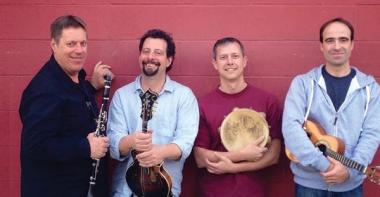
Mike Marshall, mandolin
Andy Connell, clarinet and saxophone
Colin Walker, 7-string guitar
Brian Rice, pandeiro and UC Davis lecturer in music
Mike Marshall and Choro Famoso bring a bright energy and virtuosity to their concerts, maybe matched only by the Brazilians themselves. Choro is an important musical tradition of Brazil with characteristic Afro-Brazilian rhythms and European popular dance tunes. Mike—already known throughout the world for pushing on the boundaries of many music genres—became smitten with Choro on his first adventure in Brazil.
About the Artists and Music
Mike Marshall has become a legendary figure in acoustic music. He has the ability to seamlessly blend his American roots background with a deep understanding of European classical music, Brazilian choro, and other musics of the world. Mike is a fluid Jazz improviser and a master on mandolin, guitar, mandocello, and violin. At age 20 he made his Carnegie Hall debut with jazz violinist Stephane Grappelli as a member of the David Grisman Quartet. He’s been nominated three times for Grammy awards and collaborates frequently with mandolin virtuoso Caterina Lichtenberg. He has also toured and recorded albums with Joshua Bell, Edgar Meyer, Bela Fleck, Sam Bush, and many others. He is the founding member of the Montreux Band, Psychograss, The Anger Marshall Band, and others. Committed to preserving and passing on the traditions of the mandolin, he started the Mike Marshall School of Mandolin (online), building upon the successes of The Mandolin Symposium at UC Santa Cruz and other endeavors.
Choro is a vibrant, virtuosic style that emerged in late 19th century Brazil from a mixture of European popular dance forms and Afro-Brazilian rhythms. While it reached peak popularity in the 1930's and 1940's, Choro is now enjoying a renaissance in Brazil and is growing in popularity in the U.S. and elsewhere. The greatest exponent of the choro genre was Alfredo da Rocha Viana Filho, known commonly as Pixinguinha. As a combination of European harmonic and African rhythmic sensibilities, choro mirrors the history of jazz in America. One could easily compare Pixinguinha to Louis Armstrong in stature of importance. Of African descent, Pixinguinha was one of the greatest musicians, and perhaps the single most important figure in the history of choro.
Choro Famoso seeks to bring Choro music to new ears and expose audiences to its more than 140 years of history, celebrating the diversity of Brazil and one of their first art musics. Famoso interprets the breadth of the choro canon, but highlights the "malicia—playful maliciousness—that is an important part of the genre. As a music that is traditionally committed to memory and improvised upon, it allows the musicians to spontaneously arrange the music and challenge the other players to keep up, not unlike in jazz. The playful ease with which Choro Famoso performs this Brazilian music is contagious. Its buoyancy and uplifting sound are a slam dunk for fun. Choro Famoso and Mike Marshall have recorded two albums together: Segundo Vez (2014) and Mike Marshall & Choro Famoso (2004).
